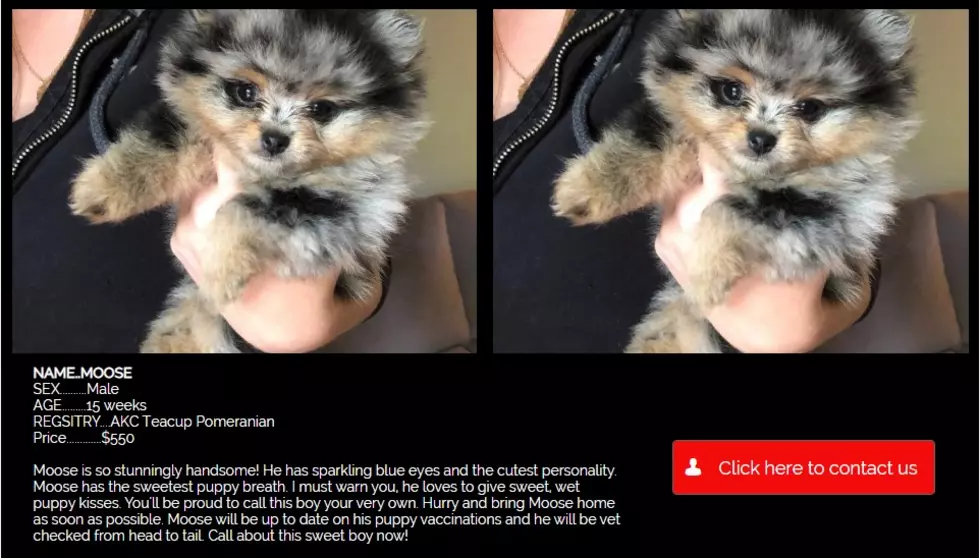
Puppy Scams Are on the Rise in West Michigan
The COVID-19 pandemic has dramatically increased the demand for pets. Many feel that they now have more time to train a puppy. Others are seeking a pet to ease the loneliness and tension of prolonged time at home. The result is a spike in pet scams, in which an online search ends with a would-be pet owner paying hundreds of dollars or more to purchase a pet that ultimately doesn’t exist. The Better Business Bureau (BBB) advises extreme caution when shopping for a pet online, especially in light of scammers’ evolving tactics.
COVID-19 has given these scammers another excuse to try to make these sales at arms-length, arguing customers can’t visit the dog in person due to health concerns
Soon after cities and states began to impose tighter restrictions to curb the spread of COVID-19, the BBB Scam Tracker saw a spike in pet fraud reports. Data from BBB Scam Tracker shows more reports about fraudulent pet websites in April than in the first three months of the year combined. The COVID bump is continuing into the holiday season with consumers reporting 337 complaints to BBB about puppy scams in November 2020, a dramatic increase from 77 for the same month in 2019.
The average loss reported to Scam Tracker in 2020 is $750. Those aged 35 to 55 accounted for half of BBB reports in 2020. At the current pace, the number of pet scams reported to BBB in 2020 will be nearly five times higher than 2017 numbers, when BBB published its first in-depth investigative study on pet scams.
“Scammers modify their cons to take advantage of current events,” says Phil Catlett, President of the Better Business Bureau Serving Western Michigan. “COVID-19 has given these scammers another excuse to try to make these sales at arms-length, arguing customers can’t visit the dog in person due to health concerns.”
One change from 2017 is the way these scams are taking payment from victims. Scam Tracker data indicates that victims are increasingly being asked to make payments through payment apps like Zelle and CashApp as opposed to wiring money through Western Union or MoneyGram. Both Zelle and CashApp have issued warnings about pet scams. Also, pet scammers now commonly use online advertising tools such as sponsored links to boost their fraudulent listings in search results.
One woman from the Traverse City area lost $2,000 to a puppy scam in November. It started with a $500 deposit paid through Zelle for a Pomeranian puppy named Moose. The website claims all its puppies are registered with the American Kennel Club and have a 30-day money-back guarantee. When it came time to ship the dog to Michigan the transportation company claimed it needed an additional $1,500 to upgrade the travel crate. The company promised the money would be refunded at the airport when the dog arrived. After paying she then got a message that the company needed an additional $2,800 for puppy insurance because the dog was stressed from the first leg of its flight. When the Traverse City woman refused to pay she was threatened with fines and possible criminal charges for puppy abandonment.
“Once one payment is made, scammers come up with a list of reasons why the customer has to send more money,” says Catlett. “They prey on your emotions, knowing that once you become attached to the idea that you will be getting a new puppy it is hard to say no.”
Excuses for additional payments often include special climate-controlled crates, insurance, and a (non-existent) COVID-19 vaccine, according to Scam Tracker reports. There also were instances where purchasers wanted to pick up the pet but were told that wasn’t possible due to COVID-19 restrictions.
A woman from Comstock Park reports losing $900 while trying to buy an Akita puppy in September. After making the initial payment, she was told she had to pay an additional $2,000 for travel insurance and a crate. After doing some research it was discovered the website had only been operating a few months. It has since been taken down.
While puppies remain the most common bait in a pet scam, other animals are used as well. 12% of pet scam complaints to BBB were about kittens or cats.
BBB recommendations for buying pets online:
- See the pet in person before paying any money. In light of the COVID-19 pandemic, consider a video call with the seller so you can see the seller and the actual pet for sale. Make sure the call is live, and not a recorded video that could be old and reused for multiple potential buyers. Since scammers are not likely to comply with the request, this may help avoid a scam.
- Do a reverse image search of the photo of the pet and search for a distinctive phrase in the description or testimonials.
- Research to get a sense of a fair price for the breed you are considering. Think twice if someone advertises a purebred dog for free or at a deeply discounted price. It could be a fraudulent offer.
- Use caution with breeders offering to ship. Check out a local animal shelter or breeder for pets you can meet before adopting or buying.

LOOK: The least obedient dog breeds
More From WBCKFM









